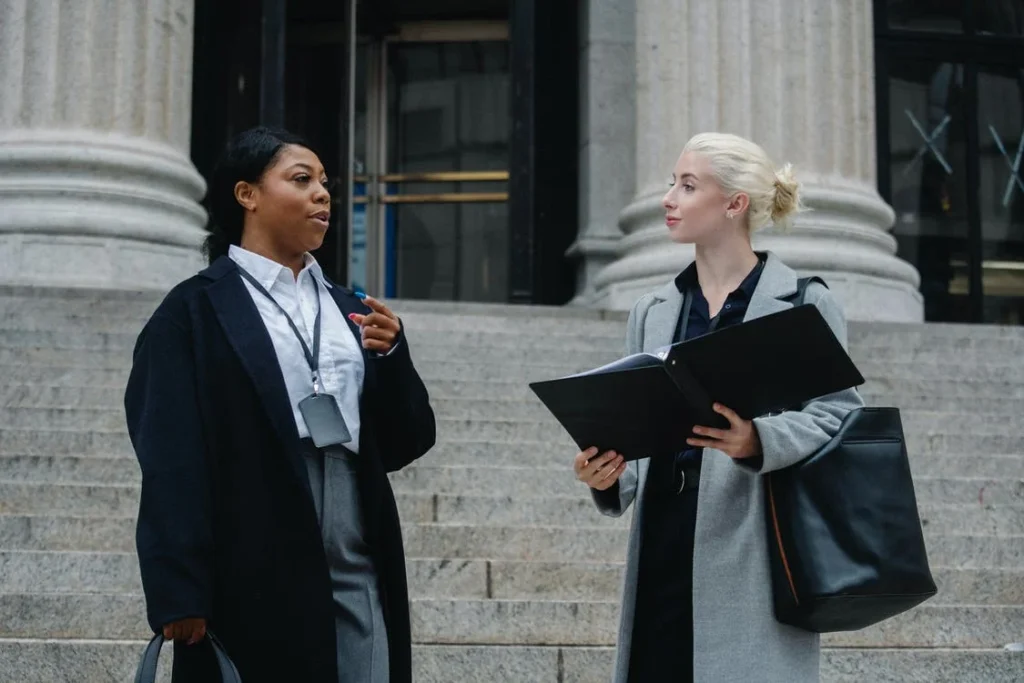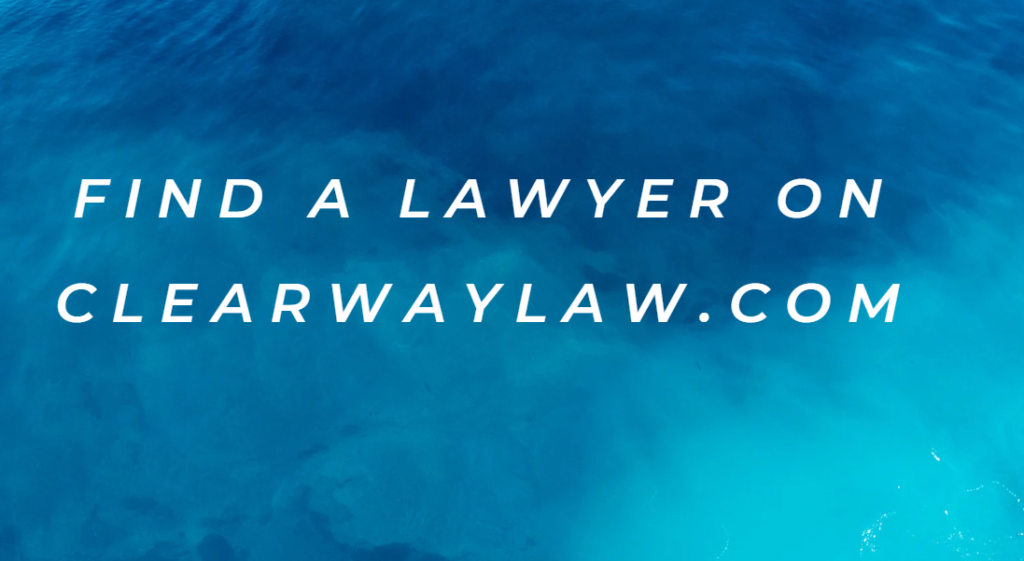We spoke to the public about if you calling yourself a lawyer is against the law, and what the word “lawyer” means. We also spoke to law firms. See the replies below.
“Lawyer” is one of those titles that shouldn’t be used loosely. Even though the title does not necessarily follow strictly defined rules, like “attorney,” if you practice law, I don’t think you should be holding out yourself as a professional that engages in law practice.
Lawyers attended and graduated from law school and passed their bar exam; therefore they’re admitted to their state’s bar association. In every state, non-lawyers are prohibited from engaging in the unauthorized practice of law, which touches the subject of referring to yourself as a legal professional without any licenses or certifications, as lawyers are required to have special knowledge of the law in certain areas. If you haven’t passed the bar, it’s best to refrain from calling yourself a lawyer. Doing so can get you into trouble.
Collen Clark, Lawyer, https://www.schmidtandclark.com/

Calling yourself a lawyer
There are a lot of legal consequences to trying to practice law in an organized setting without getting a law degree. What constitutes being a lawyer? You have to go to law school and pass the bar exam, the famous test every lawyer takes before getting their license and going out into the world of law.
Sara, 360Quote.com
It is against the law to pretend to be a lawyer, as lawyers charge their clients large sums of money for representation. Sure, the person impersonating a lawyer can be good at working in a courtroom, but they’re misleading their customers, and this is grounds for arrest for fraud.
This shouldn’t be confused with people who actually are lawyers but get their degrees from smaller colleges not famous for their law schools. Shady strip mall lawyers are still lawyers. It’s all about passing the bar and being approved by the state to practice after getting out of law school.
Unauthorized practice of law
If you want to be a lawyer, you can actually skip going to law school and just take the bar exam in the states of Washington, California, Virginia, and Vermont. This streamlines the process and helps more people become lawyers.
-Shawn Laib is a US-based legal expert with FreeAdvice.com
Yes. There is no law criminalizing anyone from claiming to be a lawyer. The only time it’s unlawful to claim to be a lawyer is when one is under an oath, as that would be perjury. However, it may be stupid to claim to be a lawyer when you’re not. There is no requirement to practice law in a court of law to be considered a lawyer. Anyone who has completed law school and passed bar exams is a lawyer. Anyone can call themselves a lawyer, even without professional qualifications in the legal field or not.
In some cases, there is no definite meaning of a lawyer. For instance, it can be anyone who is a regulated individual as a shorthand. Someone calling themselves a lawyer, therefore, does not necessarily mean it’s an official or professional title due to legal practice or having any form of formal regulation. People without professional backgrounds in law can know the field and become experts in explaining it, hence could claim to be lawyers.
Tina Willis Law, tinawillislaw.com
If you want to see a list of lawyers or search for a name to see if they are a lawyer, go to Clearway.

Can you call yourself a lawyer without passing the bar?
Yes, anyone can say that they are a lawyer. The question then becomes whether there will be consequences, and what those might be. And that depends on the context.
If a person says that they are a lawyer at a dinner with family or friends, without practicing law, or attempting to generate business, then that would be fine.
But if she advertises herself as a lawyer to the public, prepares legal documents on behalf of others, appears in court, or even gives legal advice (with or without payment), then in most (but not all) U.S. states, those things would be a crime, with varying degrees of severity. (Each state has slightly different laws and penalties for the unlicensed practice of law.)
In Florida, where I practice personal injury law, practicing law without a license is a third-degree felony. (Years ago, there actually was a senior partner at a major defence law firm where I worked who the other partners at the firm learned were not licensed. I still remember the big firm meeting where the other partners were in shock.
Calling yourself a lawyer
And the entire firm immediately required all lawyers to provide proof of their licensing status. Yikes! Since you never know when this could be a problem, anytime you hire a lawyer, you should always check their licensing status with their state bar association.)
In addition to criminal statutes specifically punishing “the unlicensed practice of law,” there are separate criminal statutes governing fraud and deceptive trade practices, which could also be used by a determined prosecutor. Unfortunately, there are many small storefronts that advertise legal document preparation (often in family law, or immigration).
Many of those openly advertise, including storefront signs, and websites, explaining exactly what services they provide. And they stay in business for years without having problems. In other words, even though practicing law without a license is illegal, the punishment statutes are rarely enforced.
No, you cannot claim you are a lawyer or falsely tell others that you are a lawyer if you are not.
What You Need to Know if You Plan to Practise Law
Claiming you are a lawyer and working with (or even attempting to work) clients in the capacity of a lawyer cannot be done unless you’ve taken the proper steps and have the right credentials. The term ‘lawyer’ refers to someone who has the proper education and training to work in that capacity. Without the proper education, certifications, and training, you cannot make this claim.
How can you become a lawyer so you can call yourself one? You must dedicate yourself to about 7 years of post-secondary schooling, including 4 years of undergraduate study, followed by 3 years (or more) of law school. During these years, you’ll have to consistently pass your courses and the tests that are thrown at you. You must succeed in order to continuously reach the next level and, eventually become a certified lawyer.
Until this time, you cannot call yourself a lawyer and claim to have that accreditation that can only be used by those people who have passed through the necessary steps.
-Anthony Kalka, The Kalka Law Group, sterlingsky.ca

Not anyone can call themselves a lawyer in Australia
A lawyer is a highly trained individual in the laws applicable to a particular jurisdiction often requiring 6 years plus of tertiary education. An individual lawyer must act with an absolute sense of commitment to their client but also need to be aware that they must balance this commitment with their overriding obligation to the court and the judicial system. Integrity is paramount.
A lawyer needs to provide services and advice often upon complex technical matters ranging from finance, property, privacy, and personal and public rights such as criminal, family, and personal injury to place their client in the best possible position. Very high standards of professional attention are required by the individual lawyer.
A good lawyer can change law precedents and people’s lives through their efforts. As a lawyer one often needs to wear multiple hats including the judge, jury, forensic expert, counsellor, confidant, doctor, investigator, psychologist, accountant etc !! What other professional has this range of responsibilities?
There is a great responsibility
The profession of a lawyer can be equated to being a “legal surgeon” with a life-threatening operation to perform, where the desk is the operating table.
With a lawyer’s ability comes great responsibility, as they have serious obligations to society and their clients! Depending on the situation it’s inconceivable that a lawyer can individually change the impact and extent of laws and their application through cases in which they are involved.
The digital age and Mr. Google have made the public nowadays much more aware of their legal rights and lawyers must accept they are in a service industry where clients want instantaneous results and service. Most lawyers in the past failed to respond accordingly but the situation has changed.
-Gerard Malouf, Gerard Malouf & Partners, https://www.gerardmaloufpartners.com.au/
Be a practicing lawyer
In the US, anyone can say they’re a lawyer, but that doesn’t mean they are one. In order to be a practicing lawyer, you must have a law degree from an accredited institution and pass your state’s bar exam. So while anyone can technically call themselves a lawyer, it’s important to make sure they are actually qualified to practice law before hiring them for legal services.
There are some states that allow non-lawyers to provide limited legal services, such as paralegals and legal document assistants. These professionals can help with tasks such as preparing and filing paperwork, but they cannot provide legal advice or represent clients in court.
If you’re not sure whether someone is a qualified lawyer, you can always ask to see their law degree and bar admission certificate. You can also check with your state’s bar association to see if the person is licensed to practice law in your state. Hiring a qualified lawyer is important because they will be able to provide you with expert legal advice and representation. Non-lawyers cannot provide this type of service, so it’s important to make sure you’re working with a qualified professional if you need legal assistance.
Kevin Wang-
Co-owner/Inyouths LED Mirrors, https://www.inyouths.com/
Calling yourself a lawyer
It takes a special person to be a lawyer, but before anyone can say they are a lawyer, they must first undergo years of gruelling study and case experience.
Becoming a lawyer involves completing an approved and accredited law degree and undergoing supervision in one or multiple legal firms. A prospective applicant must successfully be admitted as a lawyer by satisfying the relevant requirements of the legal board in their corresponding state or territory. In Australia, it takes around 6-7 years to become a lawyer. However, this timeframe may vary for other countries.
Excellent communication skills including the ability to write effectively and persuasively, speak confidently in public as well as listen actively are key requirements for any lawyer. Logical and critical thinking skills are valued highly as well as the ability to analyze situations and draw appropriate conclusions. Being a team player and having high attention to detail characterizes a good lawyer, in addition to having the ability to perform within time constraints and under pressure.
There you have it. Being a lawyer is not for everyone. However, if you have the dedication, fair judgement, and the required abovementioned skills, a career in law may be for you.
-Kirallie, nononsensetutoring.com.au
Can you call yourself a lawyer UK?
In the United Kingdom, anyone can say they are a lawyer, but there are certain requirements that must be met in order to be a qualified lawyer. In order to be a qualified lawyer in the United Kingdom, one must first complete a law degree at an accredited university. Once you have obtained your degree, you must then complete a professional legal training course, known as the Legal Practice Course (LPC).
When you have completed the LPC, you will be required to undertake a period of professional legal work experience, known as a training contract. Once you have completed your training contract, you will be eligible to apply to be a qualified lawyer. In addition, lawyers must adhere to strict ethical codes and maintain their professional licenses in good standing. There are also a number of other requirements that must be met in order to be a qualified lawyer, but these are the main ones.
-Brandon Wilkes, The Big Phone Store, Website: https://www.thebigphonestore.co.uk/
We hope this article convinced you that calling yourself a lawyer isn’t okay.











